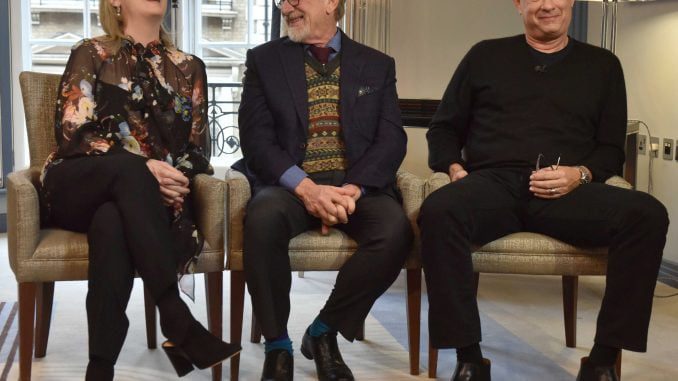
Steven Spielberg’s new movie “The Post” depicts a newspaper’s decision to defy the government, risk its financial health and imprisonment of its editors in order to report a hard truth and defend the press’ First Amendment rights by publishing the Pentagon Papers.
After the Washington Post’s decision to inform the American people that top government officials had known that the Vietnam War was unwinnable yet had repeatedly lied about it for years, editor Ben Bradlee (played by Tom Hanks) dumps a pile of out-of-town newspapers on a desk for publisher Katherine Graham (Meryl Streep) to see. We’ve started a “rebellion,” Bradlee informs Graham. We’re no longer in speaking truth to power.
No way would that happen today.
I was pleased to see that “The Post” highlights the pressures and biases that weighed against publication: a publisher undermined by sexism and low expectations, a paper trying to raise capital under the eye of nervous bankers, the Nixon Administration’s take-no-prisoners prosecutorial abuse by a vicious attorney general, and — not least — the Post’s cozy establishmentarianism, centered around Graham’s famous hard-drinking salons where reporters hobnobbed with the officials they were supposed to cover objectively.
After a lot of wavering and gnashing of lawyerly teeth, Graham finally makes the call: go to press.
The key point of this story, which isn’t made in the movie and few younger moviegoers are likely to be aware of, is that it was her decision to make. The Graham family held controlling interest in the Washington Post Company. Great newspaper families like the Grahams, the Chandlers and the Sulzbergers were quirky and often had bad politics. But they also had something today’s corporate, publicly traded media outlets do not: editorial freedom.
They didn’t always do the right thing. But they could. So sometimes they did.
Sadly, those days are gone.
Amazon CEO Jeff Bezos, reportedly a right-leaning libertarian, bought the Post in late 2013. What reception would a Daniel Ellsberg (who leaked the Pentagon Papers) or an Edward Snowden get if they contacted a Post reporter today, under Bezos?
Snowden’s case is indicative. The Post and three other papers published Snowden’s NSA leaks in 2013, months before Bezos took over. In 2016, the Bezos-owned Post called upon President Barack Obama to refuse Snowden’s pardon application. In so doing, wrote Glenn Greenwald, the Post “achieved an ignominious feat in U.S. media history: the first-ever paper to explicitly editorialize for the criminal prosecution of its own source — one on whose back the paper won and eagerly accepted a Pulitzer Prize for Public Service.”
Even more obnoxiously, the Post’s Snowden editorial didn’t mention its major conflict of interest related to intelligence agencies like the NSA. Amazon — the Post’s sister company under Bezos — had the CIA (where Snowden also worked) as a client.
Given the Trump Administration’s attacks against “fake news” and the news media, it may seem paradoxical to suggest government action as a solution to the corruption of the news media as we’re seeing at outlets like The Washington Post and Los Angeles Times. But the evidence is clear. Outrageous deals such as these amount to government censorship of the news media — a violation of the First Amendment’s fundamental principle.
Congress should prohibit such arrangements.
Ted Rall’s (@tedrall) brand-new book is “Meet the Deplorables: Infiltrating Trump America,” co-written with Harmon Leon. His next book will be “Francis: The People’s Pope,” the latest in his series of graphic novel-format biographies. Publication date is March 13, 2018.

